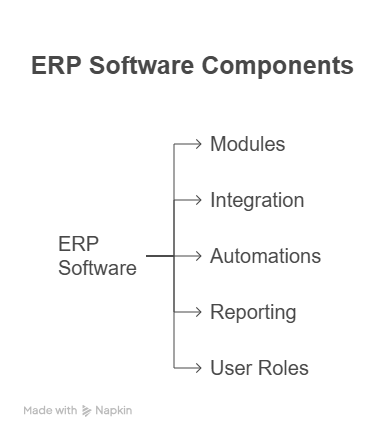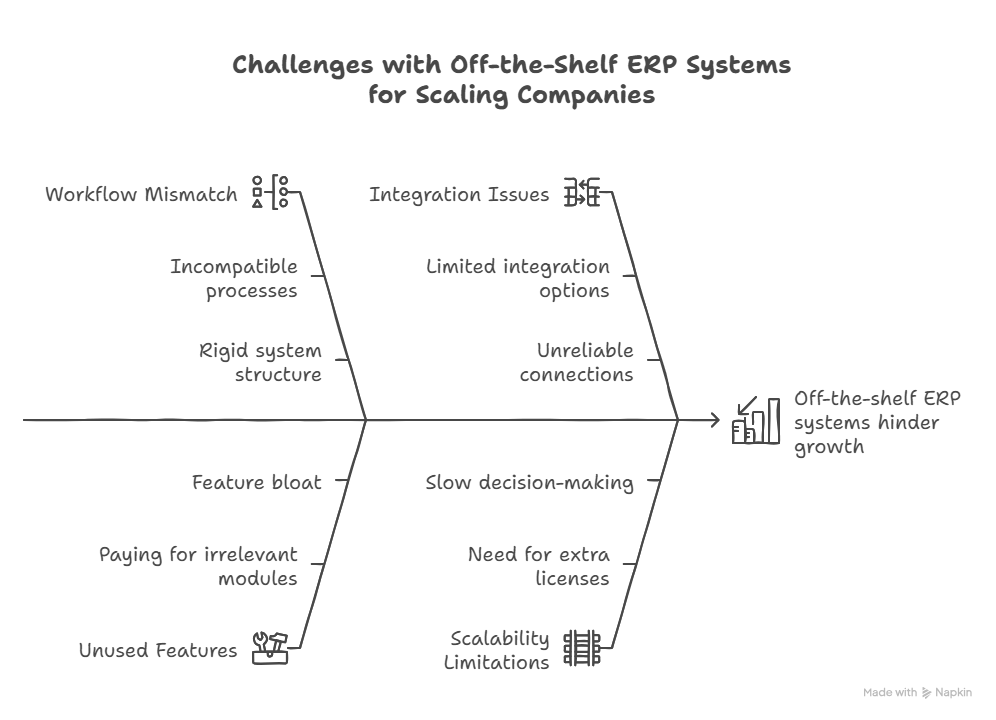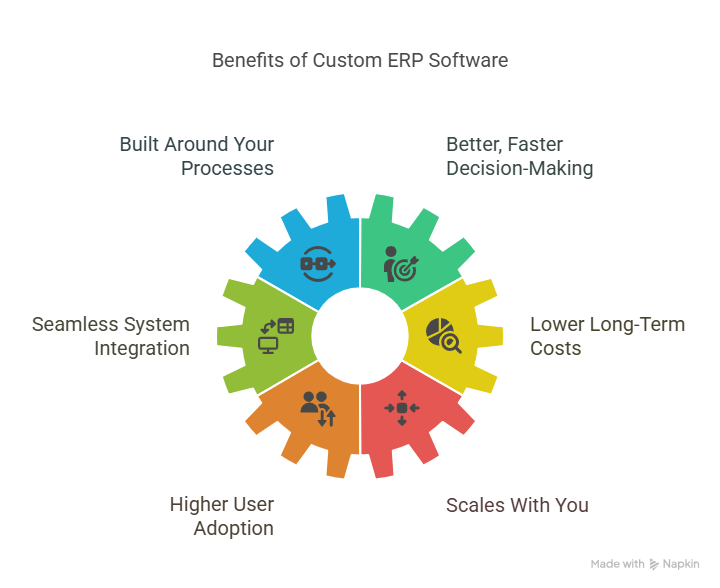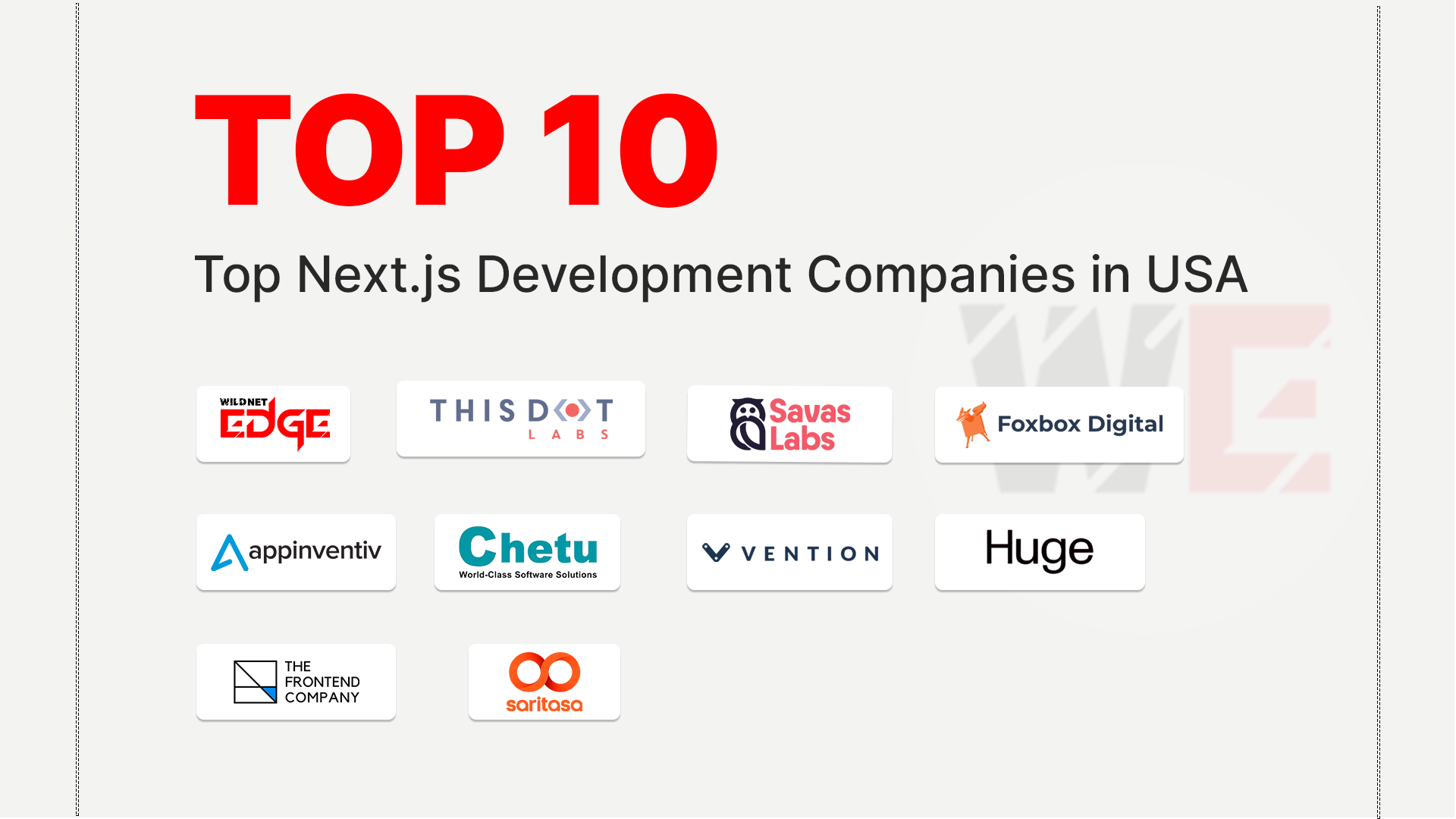If you’re leading a growing company, you’ve probably hit a point where your systems just don’t keep up anymore. What used to work, spreadsheets, manual tracking, or even basic ERP software, now creates friction instead of flow.
That’s where custom ERP software development becomes more than a tech upgrade; it becomes a strategic move.
When businesses scale, complexity increases. You’re dealing with more teams, more data, more moving parts, and trying to manage it all with generic tools usually leads to workarounds, delays, and missed opportunities. I’ve seen this happen in companies across industries: they outgrow the systems that once supported them.
In this blog, I’ll walk you through why scaling companies often need more than off-the-shelf ERP software, and how investing in a tailored solution helps you unlock better efficiency, visibility, and long-term control.
What Is Custom ERP Software Development?

ERP stands for Enterprise Resource Planning, a system that helps you manage business functions like finance, inventory, HR, operations, and customer data, all in one place. Most businesses start with off-the-shelf ERP solutions because they’re quick to deploy and cover the basics.
But here’s the problem: once your business starts to grow, those “standard” features often don’t fit the way you actually work.
That’s where custom ERP software development comes in.
Instead of trying to force your workflows into a pre-built system, you build an ERP platform around the way your business already runs, and how you want it to grow. You decide what modules you need, how they connect, what data you want to see, and how your teams interact with it.
A good custom ERP software development company will start by understanding your operations and then design a system that matches your processes, not someone else’s template.
With custom ERP software, you’re not limited by what’s in the box. You control the architecture, integrations, user roles, automation, and reporting, all tailored to your business model.
Why Scaling Companies Outgrow Generic ERP Systems

Off-the-shelf ERP systems are built to appeal to a broad audience. That works fine when your business is small or your operations are simple. But once you start growing, those same systems start to hold you back.
Here’s what I see happen most often with scaling companies:
1. Your workflows don’t match the software
You find yourself constantly adjusting how your team works, just to fit the limitations of the ERP. That’s backward. Your software should support your processes, not force you to change them.
2. You’re paying for features you don’t use
Generic ERP platforms come loaded with features you might never need, but you’re still paying for them. Worse, the features you do need often aren’t customizable without expensive plugins or workarounds.
3. Integrations are limited or unreliable
As you add tools for sales, marketing, logistics, or customer service, your ERP should connect the dots. Most off-the-shelf platforms struggle here. They offer limited API access, or integrations that break with every update.
4. You can’t scale without extra licenses or modules
Need to add new teams, regions, or product lines? Many ERP systems charge you for every seat, every extra module, and every advanced report. Costs pile up fast, without solving the real scalability problem.
5. Reporting and decision-making are too slow
Generic ERPs often bury insights under layers of irrelevant data. If your leadership team is still downloading CSVs and stitching them together in spreadsheets, your ERP isn’t doing its job.
This is exactly where custom ERP software development makes sense. You build what you need, leave out what you don’t, and stay in control as your business grows.
Key Business Benefits of Custom ERP Software Development

Custom ERP software isn’t just about having a system that “works.” It’s about having a system that works for you, today, and as your company grows. Here’s what that looks like in practice:
1. Built Around Your Processes
Every business has its own way of doing things, from how you manage inventory to how your teams handle approvals. With custom ERP software, you’re not adjusting your process to fit the system. The system is built to match how your business actually operates.
2. Better, Faster Decision-Making
You get dashboards and reports tailored to your KPIs, not generic templates. With real-time data flowing across departments, your leadership team can act on accurate insights instead of chasing down spreadsheets.
3. Seamless System Integration
Your CRM, accounting software, logistics tools, and third-party apps all need to communicate. A custom ERP makes integration a priority from day one, so data moves automatically and workflows stay connected.
4. Lower Long-Term Costs
Yes, custom ERP software has a higher upfront cost. But over time, you avoid recurring license fees, forced upgrades, and expensive workarounds. You own the system, and the roadmap.
5. Higher User Adoption
When your ERP is designed around real user needs, your teams are more likely to use it, and use it well. That means fewer support tickets, less training time, and better data from day one.
6. Scales With You
Need to add new modules, users, or business units? No problem. A custom-built ERP is designed to grow with your company, not limit it.
What to Look for in a Custom ERP Software Development Company
Choosing the right team is just as important as choosing to build custom ERP software in the first place. You’re not just hiring developers; you’re choosing a long-term partner who will shape how your business runs.
Here’s what I recommend looking for:
1. Industry Understanding
You want a company that gets how your business works, or is willing to dig deep to learn. They should ask smart questions about your operations, not just your tech stack.
2. Experience With ERP Architecture
ERP development is not the same as building a basic web app. Look for a team that has experience designing modular, scalable systems with clean backend logic and real-world complexity.
3. Strong Integration Capabilities
A great ERP system is only as good as its ability to connect with your other tools, CRM, inventory management, accounting, HR, or customer portals. The right company should be comfortable building custom APIs or working with your existing ones.
4. A Transparent Process
You should know how the team works before you sign anything. From discovery and design to development and deployment, they should walk you through their full process and show how progress will be tracked.
5. Long-Term Support and Flexibility
Your ERP system will evolve, so the team behind it should be ready to support upgrades, bug fixes, and new features. Make sure ongoing support is built into the relationship.
6. Clear Communication
This one gets overlooked, but it’s critical. You’re going to spend months working with this team. If they don’t communicate clearly, listen closely, or respond on time, that’s a red flag.
Ready to Build an ERP That Actually Fits Your Business?
Outgrowing your ERP system isn’t a tech problem; it’s a growth problem. And trying to scale with software that wasn’t built for you only makes things harder. If your business is hitting that stage, it’s time to take a closer look at custom ERP software development.
With the right strategy and the right team, your ERP becomes more than a system of record, it becomes a competitive advantage. You get a platform that supports how you work, grows as you grow, and gives you the data, control, and efficiency to move faster.
At WildnetEdge, we design and develop custom ERP solutions for businesses that are ready to scale. Whether you’re modernizing outdated systems or starting from scratch, we’ll help you build a platform that fits, and lasts.
Talk to us today about what your ERP system should do, and let’s make it happen.
Frequently Asked Questions
1. How is custom ERP different from traditional ERP software?
Traditional ERP software comes with pre-built modules and fixed workflows, which may not align with your operations. Custom ERP software is built around how your business actually works, offering better flexibility, integration, and long-term scalability.
2. Is custom ERP software more expensive?
The upfront cost is typically higher than off-the-shelf ERP software, but custom ERP systems can reduce long-term costs by eliminating unnecessary license fees, third-party workarounds, and limitations that slow down your growth.
3. How long does it take to develop a custom ERP solution?
Timelines vary based on scope and complexity, but most custom ERP software projects take 4–12 months. A good custom ERP software development company will provide a phased roadmap so you can start using key features earlier.
4. What kind of businesses should invest in custom ERP software?
If your business is growing fast, dealing with complex operations, or constantly hitting the limits of your current ERP system, a custom solution can help you streamline operations, gain better insights, and scale more efficiently.

Managing Director (MD) Nitin Agarwal is a veteran in custom software development. He is fascinated by how software can turn ideas into real-world solutions. With extensive experience designing scalable and efficient systems, he focuses on creating software that delivers tangible results. Nitin enjoys exploring emerging technologies, taking on challenging projects, and mentoring teams to bring ideas to life. He believes that good software is not just about code; it’s about understanding problems and creating value for users. For him, great software combines thoughtful design, clever engineering, and a clear understanding of the problems it’s meant to solve.
 sales@wildnetedge.com
sales@wildnetedge.com +1 (212) 901 8616
+1 (212) 901 8616 +1 (437) 225-7733
+1 (437) 225-7733
















 AI Development Services
AI Development Services Industry AI Solutions
Industry AI Solutions AI Consulting & Research
AI Consulting & Research Automation & Intelligence
Automation & Intelligence













